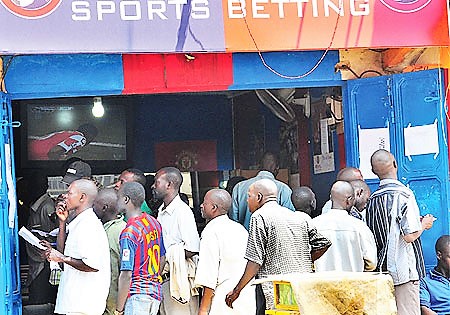The rise of gambling addiction and the dangers of underage gaming have become a pressing concern in Uganda.
Recognizing the urgency of the matter, the National Lotteries and Gaming Regulatory Board (NLGRB) has spearheaded responsible gaming awareness campaigns, such as the recent initiative in Kamwokya.
These efforts have sparked crucial conversations about the media’s ethical responsibility in addressing gambling addiction.
To delve deeper into this issue, we spoke with AL Sayed Lubega, President of the Uganda Sports Press Association (USPA), about the media’s role in preventing gambling addiction and underage gaming.
Responsible Gaming as a Moral Obligation for the Media.
Lubega emphasized that responsible gaming is not just an industry concern but a broader moral issue that affects public health and societal well being.
“As journalists, we have a duty to be accurate, accountable, and just in how we report on gambling, we need to limit excesses in our publications, avoiding sensationalism and provocative writing that might fuel gambling addiction,” he explained.
He pointed out that media coverage should not glorify gambling wins or present betting as an easy route to wealth. Instead, responsible reporting should highlight the risks associated with gambling, particularly for vulnerable groups such as the youth.
“When we present gambling as a glamorous activity, we boost the appetite of at risk individuals and contribute to the problem rather than helping solve it,” he warned.
According to Lubega, journalists must strike a balance in their reporting. “While we cannot ignore gambling-related stories, we must ensure that our narratives include warnings about addiction and financial loss,” he said.
“If we highlight someone winning a 200-million-shilling jackpot, we must also talk about those who have lost everything due to gambling.”
Has the Media Done Enough?
When asked whether the media has done enough to highlight the risks of gambling, Lubega was candid in his response. “No, we haven’t. In many ways, we have indirectly or directly benefited from the gambling industry, which has made it difficult to critique it objectively.”
He drew parallels with the alcohol industry, where breweries once feared that adding disclaimers to their advertising would hurt sales. However, over time, responsible messaging helped build public trust rather than erode revenue.
“The media should take a similar approach by incorporating responsible gaming messages into gambling-related content, for example, gambling advertisements should always carry disclaimers reminding people to bet responsibly,” Lubega suggested.
Challenges and Ethical Dilemmas.
One of the biggest challenges facing journalists is maintaining integrity when gaming companies are among the largest advertisers.
“Many media houses rely on revenue from betting companies, making it difficult to take a firm stance against gambling addiction, it’s a conflict of interest that we need to navigate carefully, he admitted.
He proposed that media houses acknowledge these conflicts by being transparent about sponsored content. “If a show or article is funded by a betting company, we should clearly label it as such,” he said.
He continued and said that it allows the audience to distinguish between independent reporting and promotional material.
Another challenge is the lack of resources for investigative journalism on gambling addiction in depth reports need to be conducted on effects of gambling.
“ We need funding to visit rehabilitation centers, and interview affected individuals, financial support, our ability to raise awareness is limited,” he said.
Guidelines for Ethical Reporting.
Lubega outlined key principles for ethical reporting on gambling related issues, stressing the importance of avoiding sensationalism and ensuring that headlines and articles do not glamorize gambling wins or portray betting as an easy path to riches.
He also urged journalists to highlight the risks and consequences of gambling, ensuring that stories include information about gambling addiction, financial ruin, and its impact on families.
“We must use responsible language. Articles should avoid phrases that encourage gambling, such as ‘life-changing jackpot’ or ‘instant riches.’”
Furthermore, he advocated for the inclusion of helpline information in every gambling-related report so that individuals struggling with addiction can access support services.
“Every gambling-related report should include contact details for support services, such as toll-free helplines for gambling addiction,” Lubega added.
He also stressed that media houses should disclose sponsorships, making it clear when gambling content is paid for by betting companies to maintain credibility and transparency.
Collaboration Between Media, Regulators, and Gaming Companies.
Lubega emphasized that collaboration among stakeholders is crucial for promoting responsible gaming. “If media houses, regulators, and gaming companies work together, we can create uniform messaging that emphasizes responsible gambling,” he said.
Such collaborations could involve funding public awareness campaigns where gaming companies allocate part of their revenue to support media campaigns on responsible gaming.
He also proposed standardizing responsible gaming messages so that all gambling advertisements include clear disclaimers and warnings.
Additionally, he suggested that regulators and gaming companies should fund in-depth stories on gambling addiction without influencing editorial content.
The Future of Responsible Gaming Awareness.
Looking ahead, Lubega is optimistic about the future of responsible gaming awareness in Uganda. “We’ve made significant progress, but we must ensure that the message remains consistent and frequent,” he said.
“If we only talk about responsible gaming once in a while, the public will forget, different demographics require tailored messaging,” he noted.
“A campaign targeting youth should be different from one aimed at middle-aged gamblers and we must use varied communication strategies to reach all segments of society,” Lubega explained.
Managing Conflicts of Interest.
Lubega stressed that media houses must take proactive steps to manage conflicts of interest. “Declaring conflicts of interest should become a standard practice. If a betting company sponsors a program, the audience should be informed upfront,” he stressed.
Additionally, he urged media houses to create editorial policies that separate gambling advertisements from journalistic content.
“We must ensure that advertising revenue does not compromise our responsibility to inform and protect the public,” he stated.
A Call to Action for Journalists.
In his final message, Lubega urged journalists to treat gambling addiction with the same urgency as other public health crises.
“When there’s a cholera outbreak or a landslide, the media mobilizes resources to cover the disaster, gambling addiction should be treated with the same level of concern,” he said.
He called for increased media investment in investigative journalism on gambling-related issues. “We need to go beyond surface-level reporting and explore the deeper impact of gambling addiction on individuals and families,” he said.
Ultimately, Lubega believes that the media has a crucial role in shaping public perceptions of gambling. “We have the power to influence attitudes and behaviors,” he said.
“If we take our ethical responsibilities seriously, we can help reduce gambling addiction and promote responsible gaming,” he continued.
The interview with USPA President Ali Sayed Lubega shed light on the ethical challenges facing the media in reporting on gambling.
While the industry remains a major source of revenue for many media houses, journalists must balance financial interests with their duty to inform and protect the public.
By avoiding sensationalism, highlighting the risks of gambling, and collaborating with regulators and gaming companies, the media can play a pivotal role in promoting responsible gaming in Uganda.
By Sherinah Namubiru





